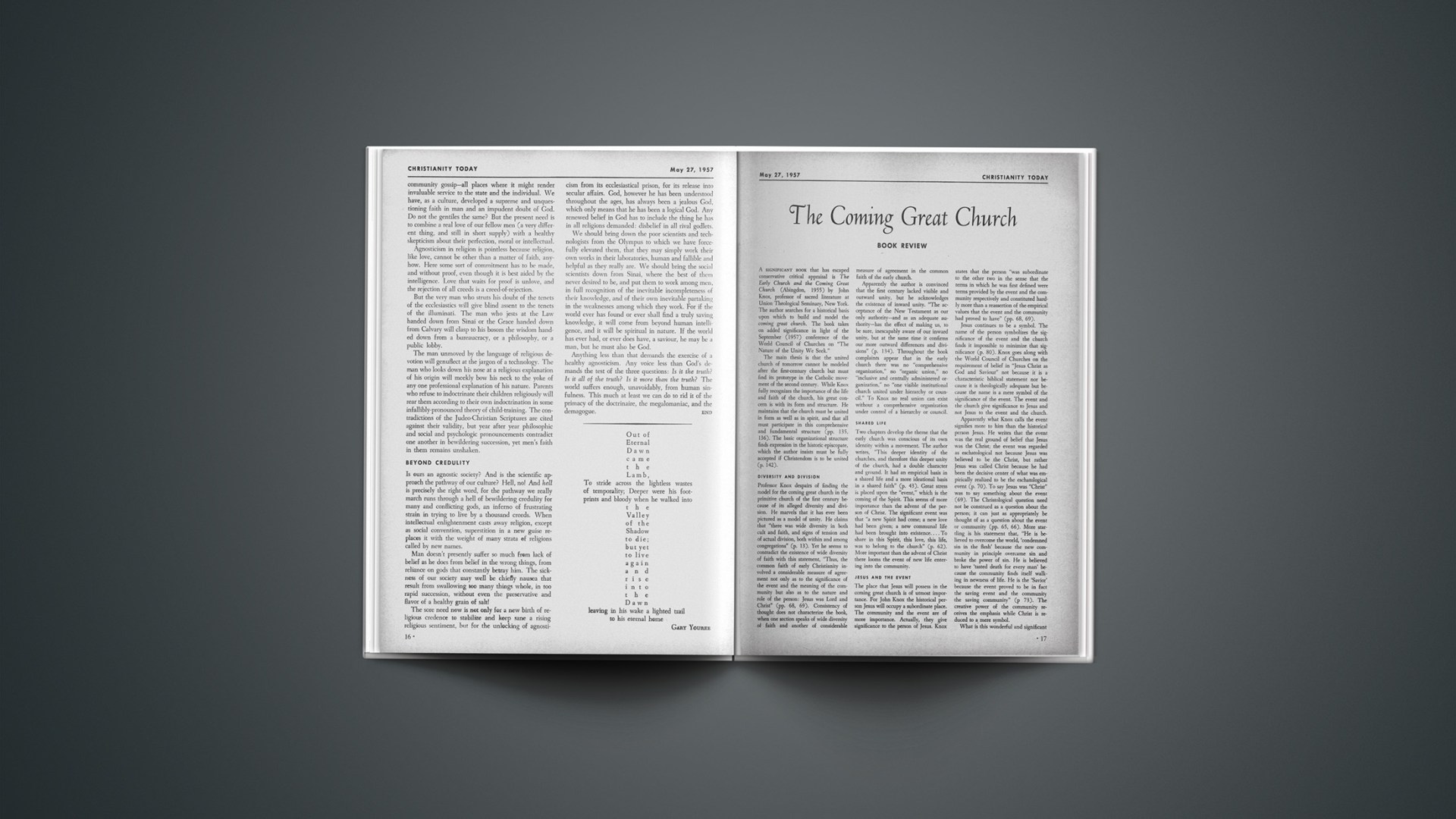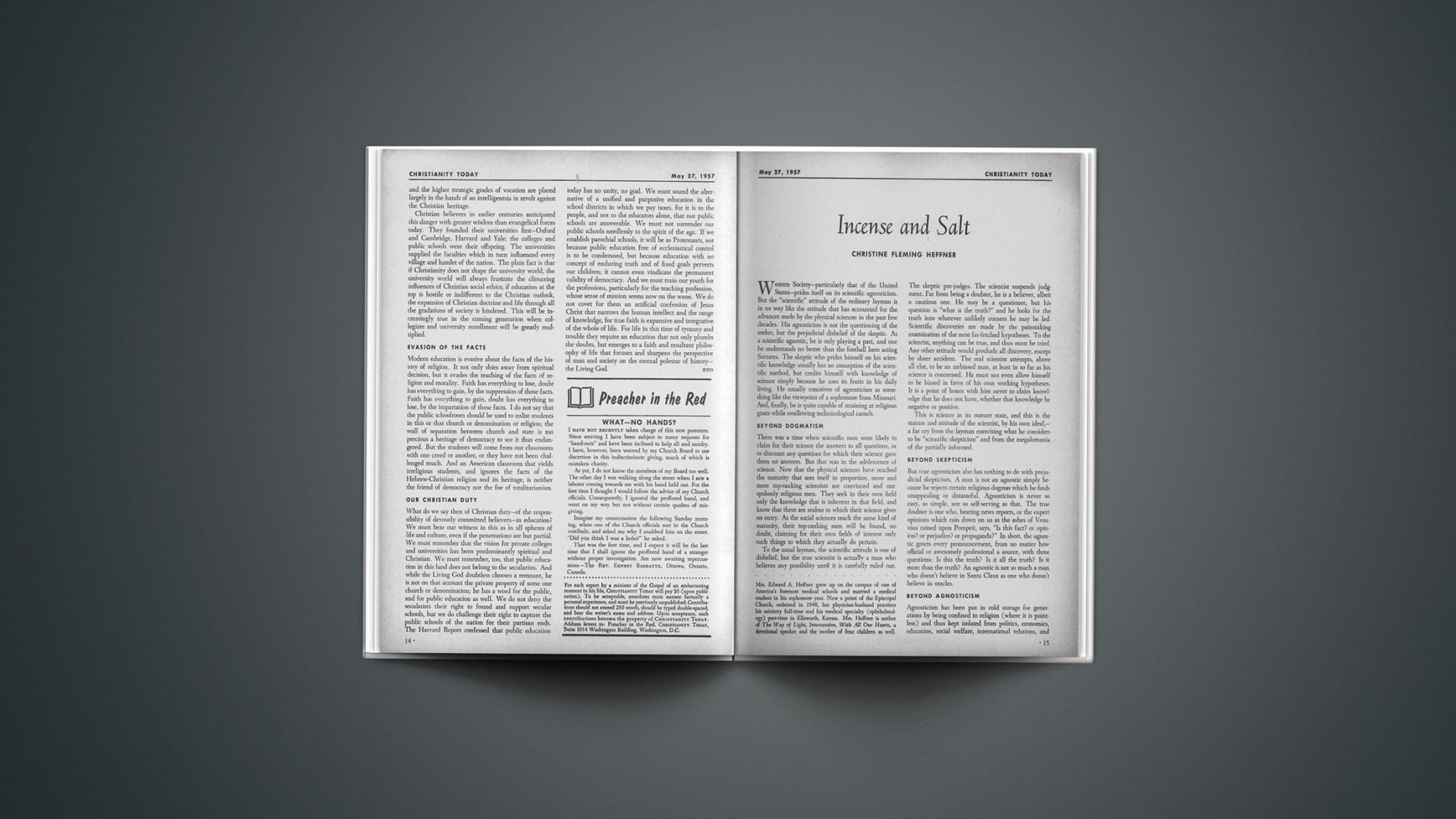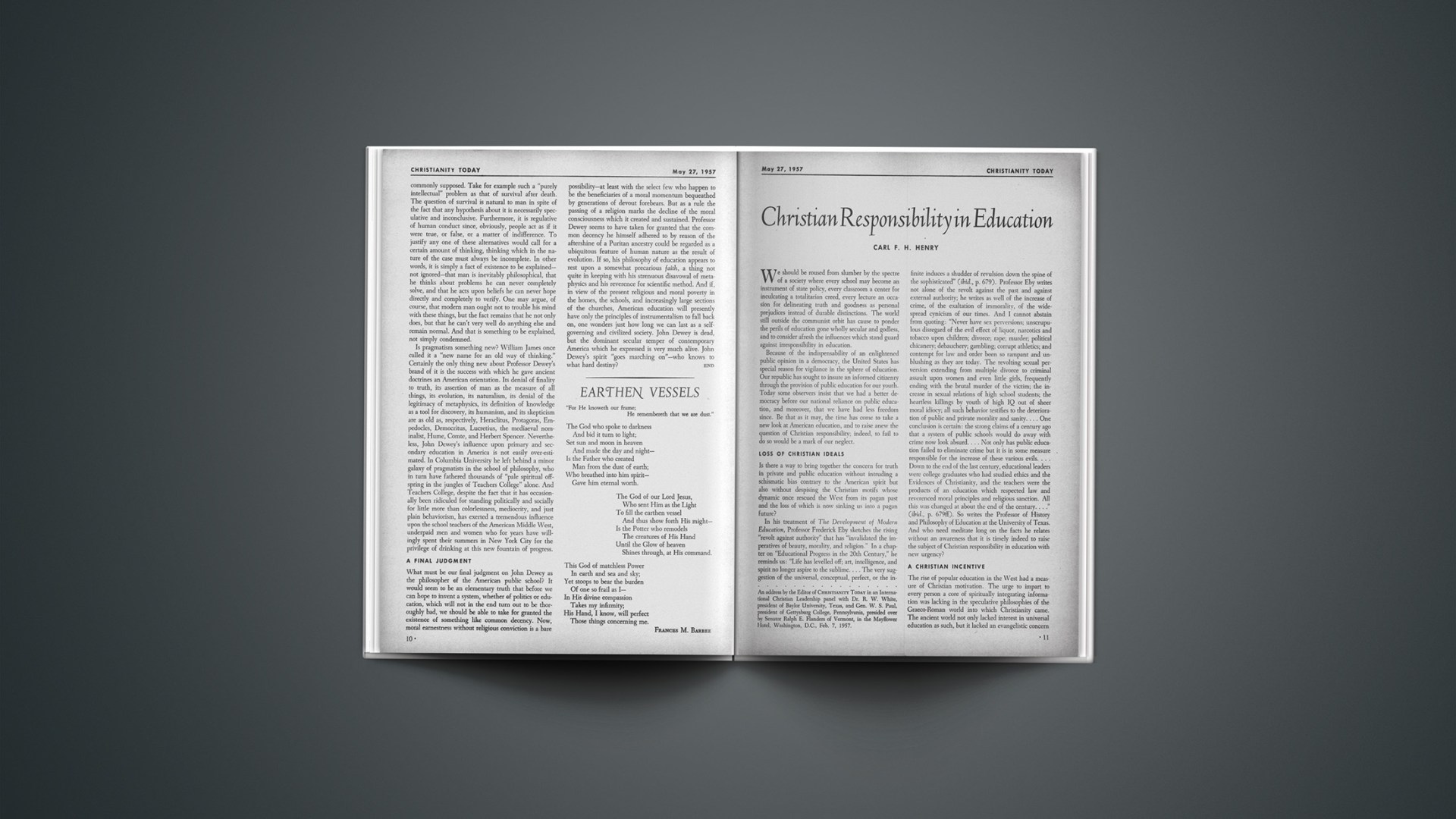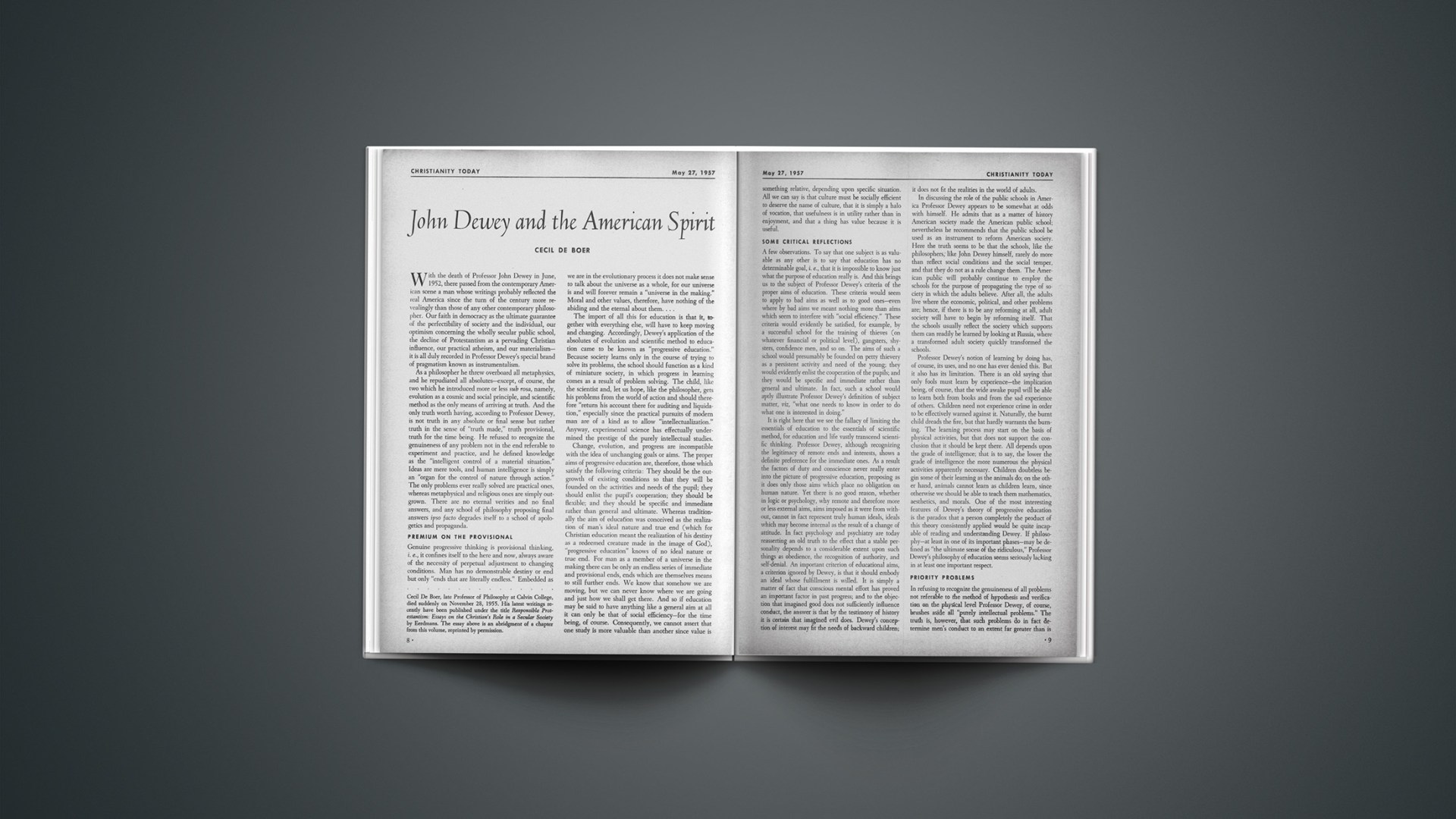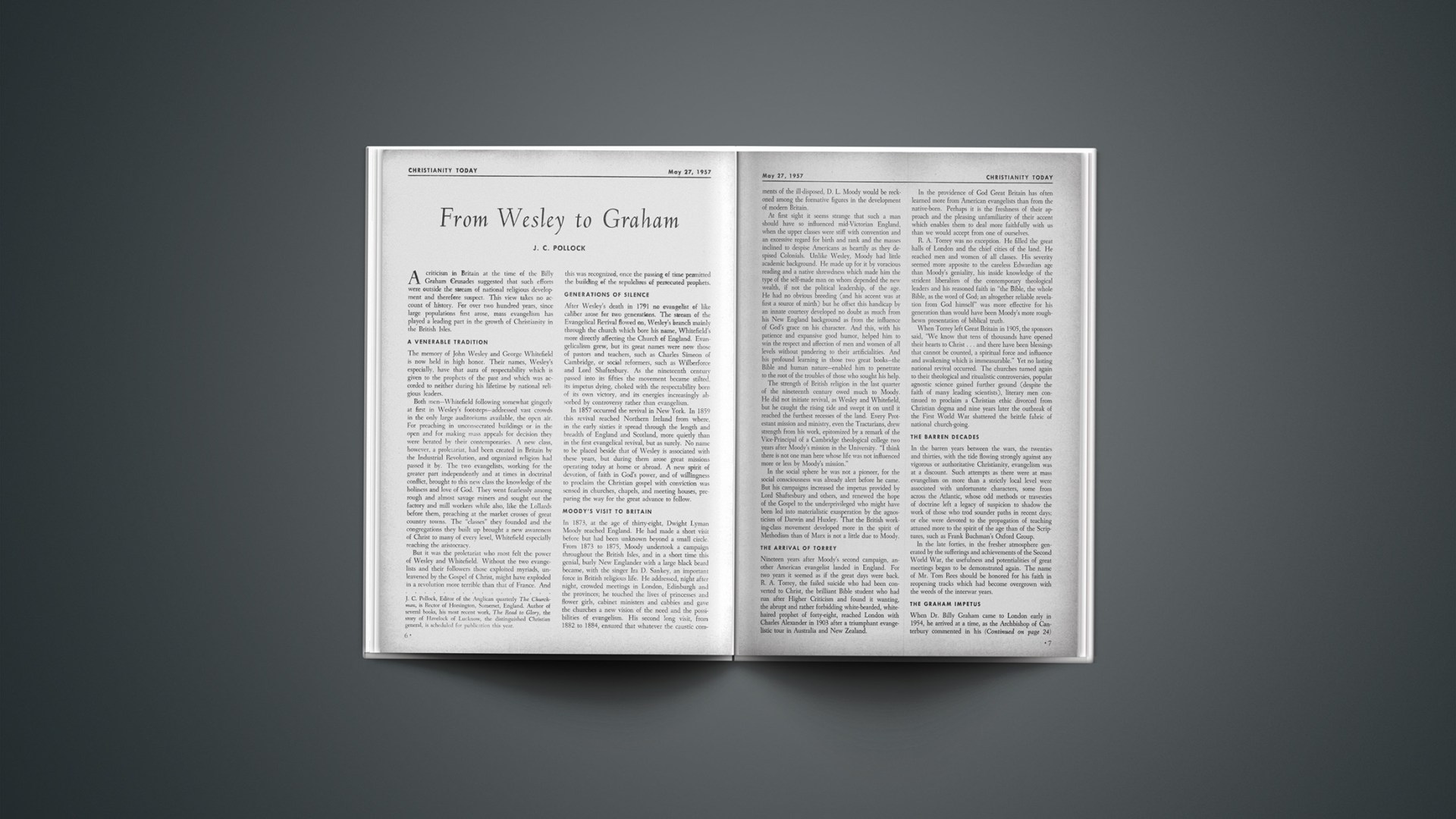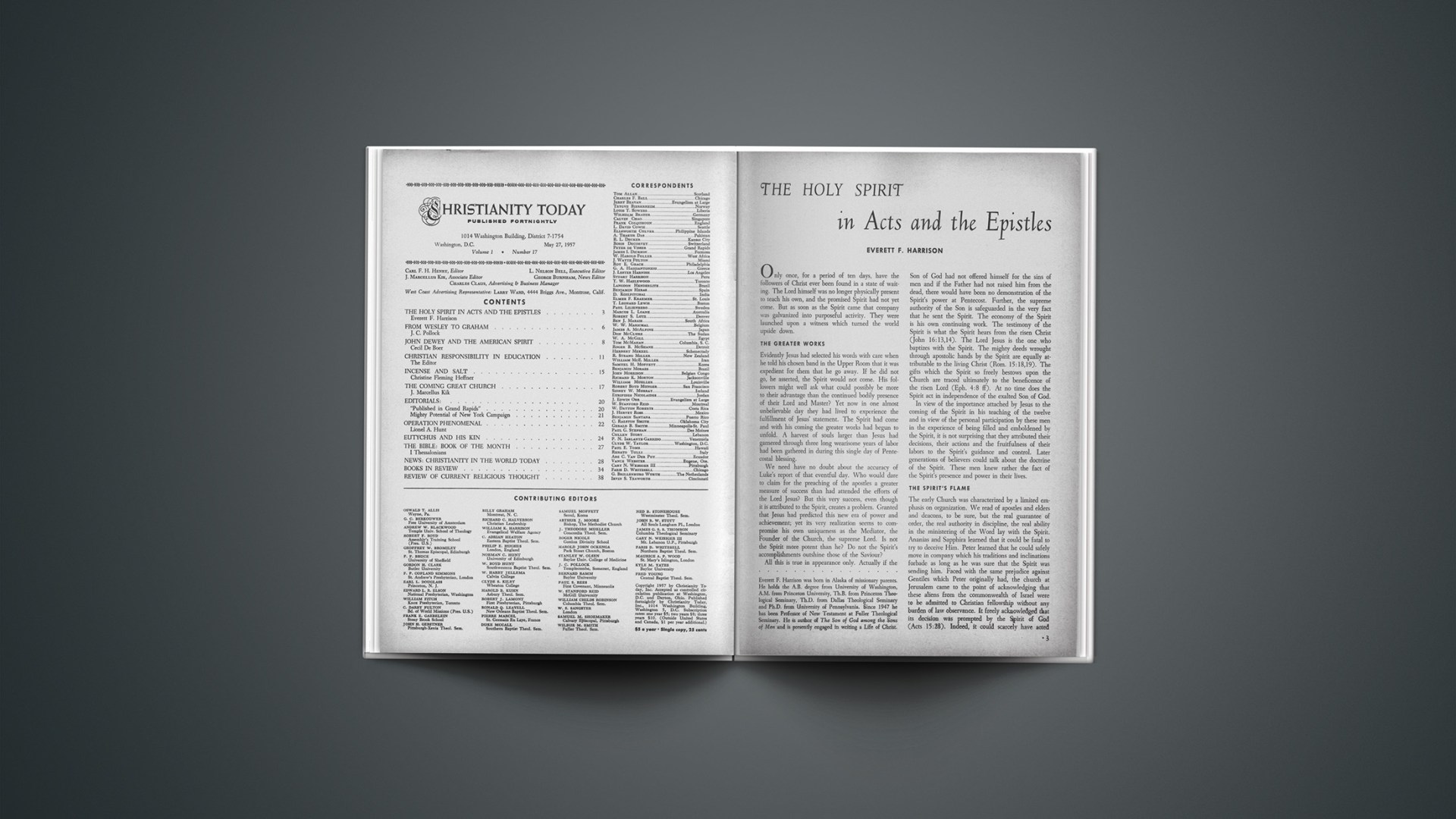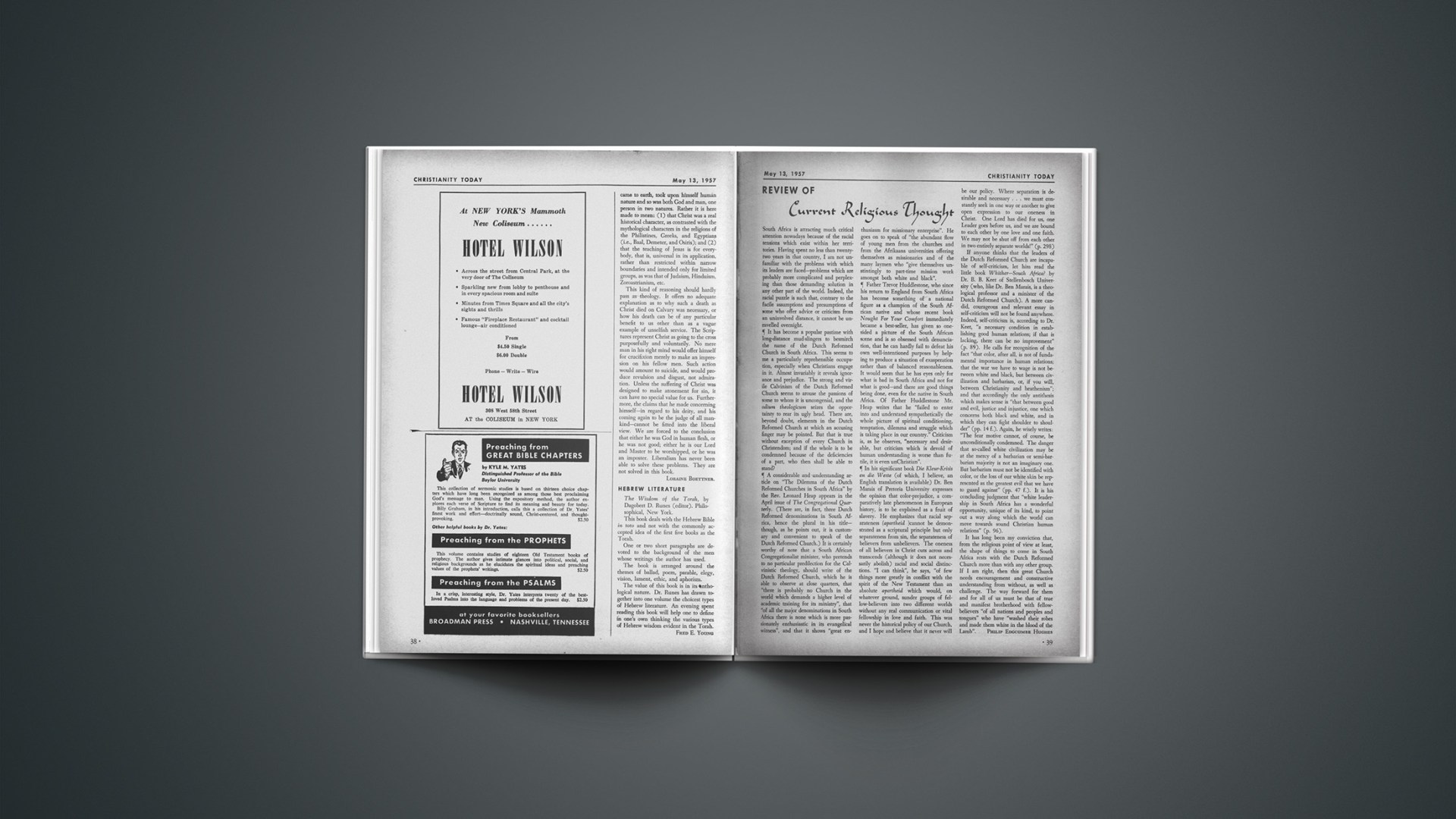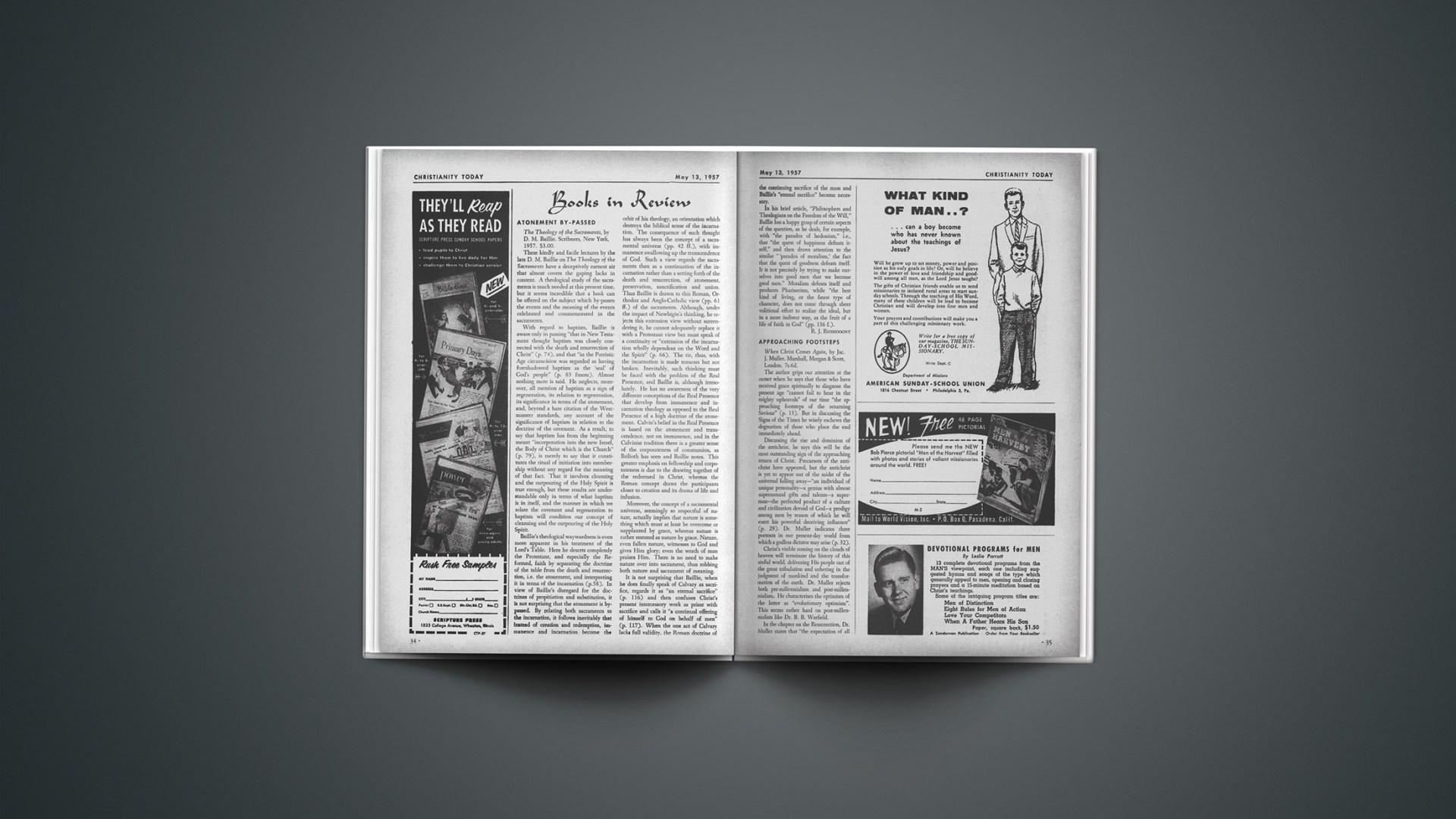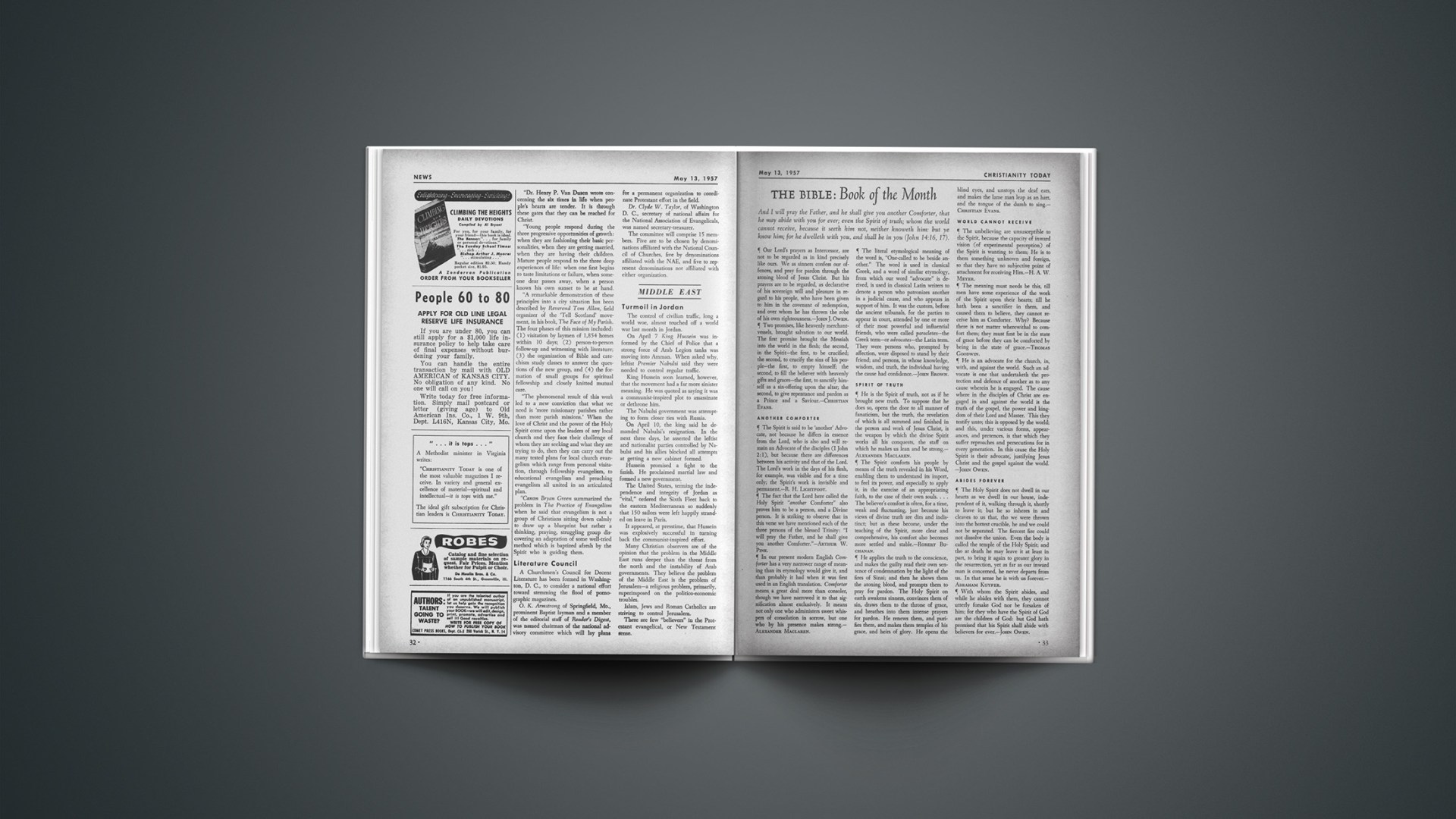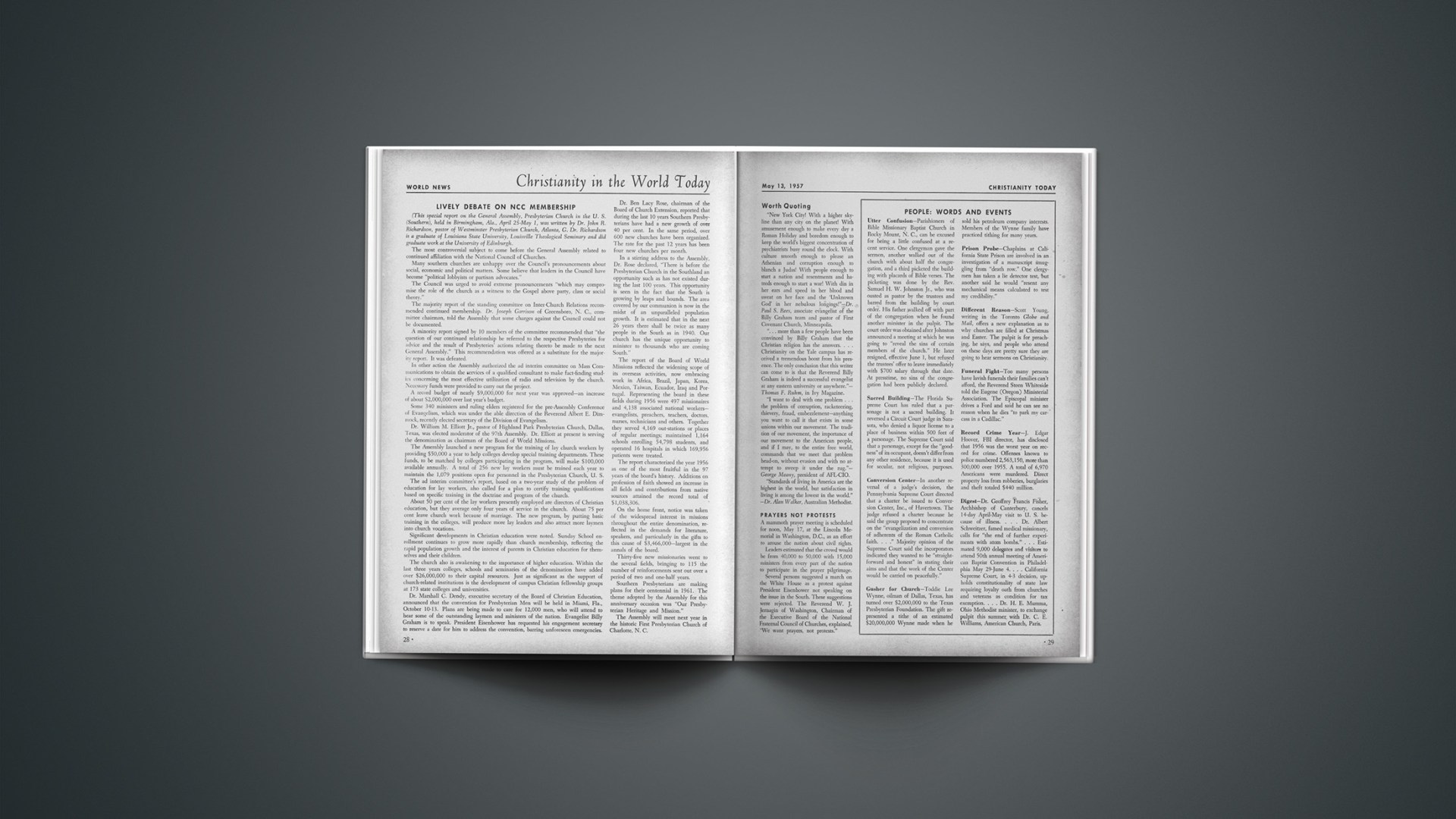A significant book that has escaped conservative critical appraisal is The Early Church and the Coming Great Church (Abingdon, 1955) by John Knox, professor of sacred literature at Union Theological Seminary, New York. The author searches for a historical basis upon which to build and model the coming great church. The book takes on added significance in light of the September (1957) conference of the World Council of Churches on “The Nature of the Unity We Seek.”
The main thesis is that the united church of tomorrow cannot be modeled after the first-century church but must find its prototype in the Catholic movement of the second century. While Knox fully recognizes the importance of the life and faith of the church, his great concern is with its form and structure. He maintains that the church must be united in form as well as in spirit, and that all must participate in this comprehensive and fundamental structure (pp. 135, 136). The basic organizational structure finds expression in the historic episcopate, which the author insists must be fully accepted if Christendom is to be united (p. 142).
Diversity And Division
Professor Knox despairs of finding the model for the coming great church in the primitive church of the first century because of its alleged diversity and division. He marvels that it has ever been pictured as a model of unity. He claims that “there was wide diversity in both cult and faith, and signs of tension and of actual division, both within and among congregations” (p. 13). Yet he seems to contradict the existence of wide diversity of faith with this statement, “Thus, the common faith of early Christianity involved a considerable measure of agreement not only as to the significance of the event and the meaning of the community but also as to the nature and role of the person: Jesus was Lord and Christ” (pp. 68, 69). Consistency of thought does not characterize the book, when one section speaks of wide diversity of faith and another of considerable measure of agreement in the common faith of the early church.
Apparently the author is convinced that the first century lacked visible and outward unity, but he acknowledges the existence of inward unity. “The acceptance of the New Testament as our only authority—and as an adequate authority—has the effect of making us, to be sure, inescapably aware of our inward unity, but at the same time it confirms our more outward differences and divisions” (p. 134). Throughout the book complaints appear that in the early church there was no “comprehensive organization,” no “organic union,” no “inclusive and centrally administered organization,” no “one visible institutional church united under hierarchy or council.” To Knox no real union can exist without a comprehensive organization under control of a hierarchy or council.
Shared Life
Two chapters develop the theme that the early church was conscious of its own identity within a movement. The author writes, “This deeper identity of the churches, and therefore this deeper unity of the church, had a double character and ground. It had an empirical basis in a shared life and a more ideational basis in a shared faith” (p. 43). Great stress is placed upon the “event,” which is the coming of the Spirit. This seems of more importance than the advent of the person of Christ. The significant event was that “a new Spirit had come; a new love had been given; a new communal life had been brought into existence.… To share in this Spirit, this love, this life, was to belong to the church” (p. 62). More important than the advent of Christ there looms the event of new life entering into the community.
Jesus And The Event
The place that Jesus will possess in the coming great church is of utmost importance. For John Knox the historical person Jesus will occupy a subordinate place. The community and the event are of more importance. Actually, they give significance to the person of Jesus. Knox states that the person “was subordinate to the other two in the sense that the terms in which he was first defined were terms provided by the event and the community respectively and constituted hardly more than a reassertion of the empirical values that the event and the community had proved to have” (pp. 68, 69).
Jesus continues to be a symbol. The name of the person symbolizes the significance of the event and the church finds it impossible to minimize that significance (p. 80). Knox goes along with the World Council of Churches on the requirement of belief in “Jesus Christ as God and Saviour” not because it is a characteristic biblical statement nor because it is theologically adequate but because the name is a mere symbol of the significance of the event. The event and the church give significance to Jesus and not Jesus to the event and the church.
Apparently what Knox calls the event signifies more to him than the historical person Jesus. He writes that the event was the real ground of belief that Jesus was the Christ; the event was regarded as eschatological not because Jesus was believed to be the Christ, but rather Jesus was called Christ because he had been the decisive center of what was empirically realized to be the eschatological event (p. 70). To say Jesus was “Christ” was to say something about the event (69). The Christological question need not be construed as a question about the person; it can just as appropriately be thought of as a question about the event or community (pp. 65, 66). More startling is his statement that, “He is believed to overcome the world, ‘condemned sin in the flesh’ because the new community in principle overcame sin and broke the power of sin. He is believed to have ‘tasted death for every man’ because the community finds itself walking in newness of life. He is the ‘Savior’ because the event proved to be in fact the saving event and the community the saving community” (p 73). The creative power of the community receives the emphasis while Christ is reduced to a mere symbol.
What is this wonderful and significant event that overshadows the person of Jesus? Knox writes that “the event was, in its final issue, the coming of the Spirit” (p. 55). “The living reality of this Spirit was the real ground of the resurrection faith. To know the Spirit was to know Christ, and in the most vital parts of the New Testament the terms can be used almost interchangeably” (p. 61). Obviously he does not have the third person of the Holy Trinity in view. The Spirit seems rather to connote a new love and a new life as he writes, “to share in this Spirit, this love, this life, was to belong to the Church.” Where does this leave the person of Christ and what is his significance for the future?
Catholic Prototype
As Professor Knox would have it, the Catholic movement of the late second century is the great prototype of the modern crusade for unity (p. 17). This movement assertedly achieved a greater measure of sound unity than the early church. Knox states that the early Catholic movement had the same goal in view and was actuated by strikingly similar inner motivations and outward pressures (p. 84). There is no claim that perfect outward unity was achieved; nevertheless, it is stated, “it brought the church a larger measure of outward unity than it had before or than it had since” (p. 129). The unity of the first century was that of life and faith; the unity of the second century laid emphasis on form and common structure (p. 133).
Knox often draws back with one hand what he gives with the other. On page 17 he states that we must “invest the early Catholic movement with an interest and importance—yes, with an authority—which it deserves and which we must acknowledge, if we are ever going really to achieve the unity it sought.” Then cautiously he admonishes the present-day “Catholic” to acknowledge the soundness of the historic Protestant emphasis upon a distinction as regards normative values between the first century and any later century (p. 146). Something essential is lost, he feels, if the authority of the second century is raised to that of the first. He seems to compromise by implying that the second century should be recognized as authority for common forms of polity and worship and the first century as to life and faith (p. 149). He concludes that “the coming great church will be apostolic as well as Catholic, and Catholic as well as apostolic” (p. 155).
He insists that those who accept the sole normativeness of the New Testament are actually affirming the normativeness of certain decisions of the Catholic church. By accepting the canon and the ancient creeds we acknowledge the authority of the early Catholic Church. Here Knox follows the well known reasoning of the Roman Catholic Church that the church invested the Scriptures with authority. The historic Protestant position has maintained that the authority of the Scriptures does not depend in any degree upon the judgment of the church nor does her sanction give them validity. The Bureau of Standards may verify that a certain metal is gold, but such verification does not make the metal gold. The Scriptures are intrinsically authoritative and the church has recognized this on internal and external evidence. Again we accept the ancient creeds not on the authority of the second-century church, but because they conform to the Scriptures. Herein Knox reveals that he is far removed from the historic Protestant position.
Acceptance Of Episcopacy
The answer to unity of the church Knox finds in what he terms the historic episcopacy. He writes frankly, “I simply cannot conceive of the union of Christendom except on the ground of a polity which … involves the full acceptance of the historic episcopate” (p. 142); “I see no hope of a united church without the universal acceptance of episcopacy” (p. 143). He feels that on this matter we cannot agree to disagree. We may disagree on matters of faith and worship but not on form and polity!
However, the acceptance of the episcopate must not involve acceptance of either the fact of apostolic succession or any understanding of its meaning. The Catholic must not insist that the only sound reason for its acceptance is the belief that it was the primitive church order or that Jesus or the apostles instituted it (pp. 145, 146). The reviewer believes this to be divisive, for some in the “coming great church” would trace the order of the ministry and the episcopate to the authority of Christ and the Apostles while others would trace this to the authority of the second-century Catholic movement or to expediency. Within this “united” church a “Catholic” and a “Protestant” party would exist.
Evangelical Misgivings
The accusation has often been leveled at the evangelical that he has no concern for greater unity, that he is basically disruptive and incapable of seeking unity, and that he has no ground for opposition to elements of present-day ecumenicity. Let fairness prevail, however. If John Knox’s conception of Christ prevails, the evangelical is asked to give up his Lord and God for what he feels to be a superficial outward unity. Christ is not a symbol to which an “event” and a community have given significance. Christ is the event. He has created and given significance to the Christian community. The headship of Christ will not be easily relinquished.
On the basis of the views expressed by John Knox, the evangelical becomes apprehensive lest tradition share the authority of the Scriptures. Traditions of men cannot be allowed to supplement the Scriptures as a rule of faith and practice. The Catholic movement of the second century must be judged by Scripture. If the practice of the second-century church becomes normative, what about the church of the third, fourth, fifth and ensuing centuries? Giving weight to human tradition leads toward Rome.
The nature of the church looms large in the thought of the evangelical, and he has serious misgivings about the emphasis on the “institutional” character of the church. E. A. Litton (Anglican) wrote long ago, “Every theory of the Church, whether it profess to be Romanist or not, which teaches that its true being lies in its visible characteristics, adopts instinctively the Romish notes and rejects the Protestant” (The Church of Christ, p. 174). Edward Schweizer, writing in Theology Today, (January, 1957), says, “The Church is also most certainly not an ‘institution’ in the Roman Catholic sense, to which Christ has delegated certain of his tasks to a hierarchy of office holders who dispense his grace.”
Many evangelicals within historic denominations have not given up the Protestant position on the nature of the church. They do not feel that deeper unity will be achieved by an “inclusive and centrally administered organization.” They cling to the conception of the church taught by Christ and the Apostles.
We concur with Knox when he concludes that the coming great church “will not be the consequence of our shrewd planning, of our cautious concessions and careful compromises. It will be God’s building.…” (p. 153). Indeed, the evangelical rejoices in Christ’s statement, “I will build my church” (Matt. 16:18); and he knows that this church is built upon the apostles and prophets, Christ himself being the chief cornerstone.
We Quote
CECIL B. DE MULE
Distinguished Motion Picture Producer
… The decision we make at our desks in Hollywood may intimately affect the lives of human beings … throughout the world.… We are responsible as artists and as molders of men’s thoughts. We have a duty to our art and a duty to the audience for whom we make our pictures. We must keep those two responsibilities clearly in view all the time. If we do that we may be able to keep our industry free of the forces which threaten to corrupt it from within and the forces which threaten to cramp and stifle it from without. Our greatest danger from within the industry is the worship of the golden calf—the temptation to care nothing about what we put on the screen as long as it makes money.… Perhaps we think it is easier to draw a crowd by pandering to their lowest tastes than by inspiring their highest ideals.… But it is treason to the human spirit, and treason to the art we serve. And we are simply stupid if we have not learned that, in motion pictures, dirt is not necessarily pay dirt.… Who else in the world can go, as our pictures go, into every corner of the world—almost into every home and heart of the world? Who else—except the missionaries of God—has had our opportunity …?—In an address to 900 leaders in the motion picture industry at the Screen Producer’s Guild Milestone Dinner.

